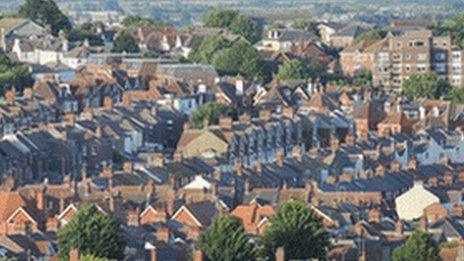Council tax benefit bombshell to hit society's poorest
- Published
- comments
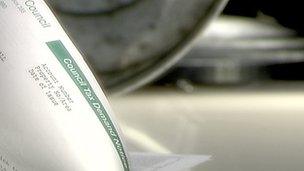
Some of the poorest people will be paying council tax for the first time
Another benefits bombshell could be on the way for some of the poorest in society.
Just as they adjust to the idea that their benefits will rise below inflation for the next three years, some now also face paying council tax for the first time.
The government is scrapping the national council tax benefit scheme from April.
Instead local authorities will have to draw up their own methods of supporting people on benefits and low incomes.
They will still get some funding from government but - and here's the catch - they'll only get 90% of what was needed to fund the support this year.
Poorest people
That leaves councils facing a dilemma on how to make up that shortfall.
The government has said councils cannot remove council tax benefit from pensioners, but it can look to ask people of working age to contribute.
That could leave councils turning to the poorest people to fill the gap.
North Tyneside Council estimates it is £1.8m short of having enough money to fully fund existing council tax benefit claims.
It is therefore considering asking all working age council tax payers to contribute at least 20% of their tax bill.
That could mean a bill of at least £200 for people who have so far avoided the tax altogether.
The Conservative mayor and cabinet say the scheme would make sure that maintenance, child benefit and some disability payments were excluded when calculating people's incomes.
The poorest would also be offered weekly payment plans to help them budget.
Public support
But the council believes it is right to ask everyone - including people on limited means - to make a contribution.
It says a public consultation also showed support for the idea.
Councillor Judith Wallace, who is deputy mayor, said: "The alternative would be to take £1.8m out of services and we don't want to see those hit.

Council tax benefit claimants like Denise, Philippa and Colin face a bill of at least £200
"And indeed the response of residents in North Tyneside indicated the majority do feel that everyone should make some contribution."
That's worrying some of the 12,500 people who'll have to pay up though.
Meadowell is one of the poorest parts of North Tyneside with high numbers of benefit claimants.
Single dad Colin Banks had to give up his job to look after his child.
He says he could not afford to pay £200 in council tax.
He added: "That's not just asking me to live on less than I'm physically able to live on, but asking my child to do the same."
Denise Downey is working, but only part-time for £500 per month, and under the scheme will be asked to pay a larger share of the tax.
She said: "To me it would be a struggle. It might have to be a choice between paying it and having enough money to feed myself and pay my gas and electricity.
"It's going to end up with a lot of people in arrears and being taken to court."
Higher bills
There is still time for a rethink as the plans still have to go to a full council meeting where Labour could vote them down.
But there are Labour local authorities also planning to ask the poorest to pay.
Newcastle and Sunderland are considering asking for at least an 8.5% contribution.
South Tyneside may look for a minimum 30% contribution from the non-disabled. That could lead to bills of £250 or more for those on benefits or low pay.
Some though believe they need to protect the people who currently claim council tax benefit.
Northumberland County Council is proposing that nobody misses out, as are Copeland and Eden with current protections retained.
And Durham County Council has just approved a similar scheme.
It is looking to plug the £5.5 million funding gap by abolishing some current council tax exemptions.
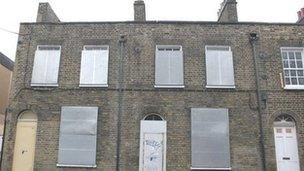
Councils can now raise council tax on empty homes to help fill the funding gap
Second home owners will no longer get a 10% discount and owners of empty homes will be asked to pay full council tax for the first time. Indeed any homes left empty for more than two years will face a bill for 150% of the tax.
But the council admits it can only guarantee that protection for this year.
Deputy leader Alan Napier said: "If we had passed that shortfall on, the average working age family on council tax benefit would have been faced with an extra £250 to pay. That's money they just haven't got."
Government help
The government says it is offering councils help though, including the powers Durham has used to remove exemptions.
In addition, local authorities that decide to restrict the tax demand to 8.5% for the poorest claimants will get access to a £100m transitional fund.
But that money is on offer for one year only, and it might not cover the full shortfall.
What local authorities will be praying for is economic revival.
Falling unemployment and rising salaries would lead to a fall in those needing council tax support.
But Durham County Council says even at a time where unemployment has fallen, it has seen 1,700 extra people claim council tax benefit.
Mr Napier added: "As a footballer I'd say this is a hospital pass from the government. They're cutting the amount of support while we're actually seeing the number of claimants go up."
And with the jobless total predicted to rise this year, the strain on councils could grow in 2013.
Many fear the government will also look to cut support again in future years.
So even the people who are protected this year, could find themselves paying council tax sooner or later.
- Published8 January 2013
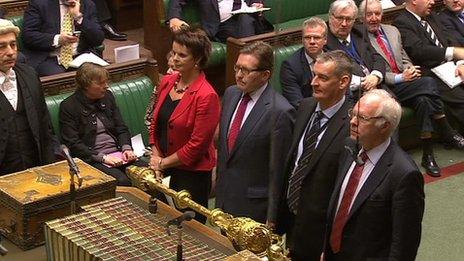
- Published23 October 2012
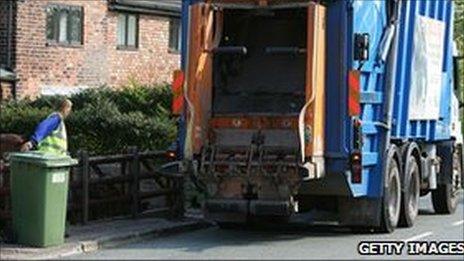
- Published2 August 2011
